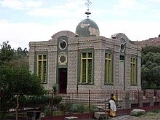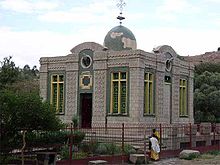
Zera Yacob
Encyclopedia
Zera Yacob (also spelled Zar'a Ya'aqob or Zar'a Ya'eqob) was a seventeenth century Ethiopia
n philosopher
. His 1667 treatise, known in the original Ge'ez language
as the Hatata
, has often been compared by a handful of non-traditional scholars to Descartes' Discours de la methode in (1637). His writing came at a period when African philosophical literature was significantly oral in character. He believed in following one's natural reasoning instead of believing what one is told by others.
 Yacob was born into a farmer's family near Aksum in northern Ethiopia, the former capital of Ethiopia under the ancient kingdom of Aksum. Yacob's name means "The Seed of Jacob" ("Zar" is the Ge'ez
Yacob was born into a farmer's family near Aksum in northern Ethiopia, the former capital of Ethiopia under the ancient kingdom of Aksum. Yacob's name means "The Seed of Jacob" ("Zar" is the Ge'ez
word for "seed"). Although his father was poor, he supported Yacob's attendance of traditional schools, where he became acquainted with the Psalms of David
and educated in the Coptic Christian faith. He was denounced before Emperor Susenyos
(r. 1607-1632), who had turned to the Roman Catholic faith and ordered his subjects to follow his own example.
Refusing to adopt the Catholic faith, he fled into exile with some gold
and the Book of Psalms
. On the road to Shewa
in the south, he found a cave at the foot of the Tekezé River
and lived in it as a hermit for two years, praying and developing his philosophy. He wrote of his experience, "I have learnt more while living alone in a cave than when I was living with scholars. What I wrote in this book is very little; but in my cave I have meditated on many other such things."
After the death of the Emperor, his son Fasiledes
(r. 1632-1667), a firm adherent of the Ethiopian Orthodox church, took power, expelling the Jesuits, and extirpated the Catholic
faith in his kingdom in 1633. Yacob left his cave and settled in Emfraz
. He found a patron, a rich merchant named Habta Egziabher (known as Habtu), and married a maid of the family. He refused to live as a monk and stated that "the law of Christians which propounds the superiority of monastic life over marriage is false and can’t come from God." However, he also rejected polygamy because "the law of creation orders one man to marry one woman."
Yacob became the teacher of Habtu's two sons and at the request of his patron's son Walda Heywat
, Yacob wrote his famous 1667 Treatise investigating the light of reason. Yacob is most noted for this ethical
philosophy surrounding the principle of harmony. He purported that an action's morality
is decided by whether it advances or degrades overall harmony in the world. His philosophy is theistic
in nature. While he did believe in a deity, whom he referred to as God, he rejected any set of religious beliefs. Rather than deriving beliefs from any organized religion, Yacob sought the truth in observing the natural world. In Hatata
in following in the footsteps of great church fathers, Yacob applied the idea of the first cause to his proof for the existence of God. "If I say that my father and my mother created me, then I must search for the creator of my parents and of the parents of my parents until they arrive at the first who were not created as we [are] but who came into this world in some other way without being generated." However, the knowability of God does not depend on human intellect, but "Our soul has the power of having the concept of God and of seeing him mentally. God did not give this power purposelessly; as he gave the power, so did he give the reality."
Little is known of Yacob's later life, but it is believed that he lived a fulfilled family life in Enfraz
, and remained there for the next 25 years and died in 1692. His year of death was recorded by Walda Heywat in an annotation to the Treatise.
Ethiopia
Ethiopia , officially known as the Federal Democratic Republic of Ethiopia, is a country located in the Horn of Africa. It is the second-most populous nation in Africa, with over 82 million inhabitants, and the tenth-largest by area, occupying 1,100,000 km2...
n philosopher
Philosophy
Philosophy is the study of general and fundamental problems, such as those connected with existence, knowledge, values, reason, mind, and language. Philosophy is distinguished from other ways of addressing such problems by its critical, generally systematic approach and its reliance on rational...
. His 1667 treatise, known in the original Ge'ez language
Ge'ez language
Ge'ez is an ancient South Semitic language that developed in the northern region of Ethiopia and southern Eritrea in the Horn of Africa...
as the Hatata
Hatata
Hatata is a 1667 ethical philosophical treatise by Ethiopian philosopher Zera Yacob, written at the request of his patron's son Walda Heywat. The philosophy is theistic in nature and came during a period when African philosophical literature was significantly oral in character...
, has often been compared by a handful of non-traditional scholars to Descartes' Discours de la methode in (1637). His writing came at a period when African philosophical literature was significantly oral in character. He believed in following one's natural reasoning instead of believing what one is told by others.
Biography

Ge'ez language
Ge'ez is an ancient South Semitic language that developed in the northern region of Ethiopia and southern Eritrea in the Horn of Africa...
word for "seed"). Although his father was poor, he supported Yacob's attendance of traditional schools, where he became acquainted with the Psalms of David
David
David was the second king of the united Kingdom of Israel according to the Hebrew Bible and, according to the Gospels of Matthew and Luke, an ancestor of Jesus Christ through both Saint Joseph and Mary...
and educated in the Coptic Christian faith. He was denounced before Emperor Susenyos
Susenyos of Ethiopia
Susenyos was of Ethiopia...
(r. 1607-1632), who had turned to the Roman Catholic faith and ordered his subjects to follow his own example.
Refusing to adopt the Catholic faith, he fled into exile with some gold
Gold
Gold is a chemical element with the symbol Au and an atomic number of 79. Gold is a dense, soft, shiny, malleable and ductile metal. Pure gold has a bright yellow color and luster traditionally considered attractive, which it maintains without oxidizing in air or water. Chemically, gold is a...
and the Book of Psalms
Psalms
The Book of Psalms , commonly referred to simply as Psalms, is a book of the Hebrew Bible and the Christian Bible...
. On the road to Shewa
Shewa
Shewa is a historical region of Ethiopia, formerly an autonomous kingdom within the Ethiopian Empire...
in the south, he found a cave at the foot of the Tekezé River
Tekezé River
The Tekezé River, also known as the Takkaze River, is a major river of Ethiopia, and forms a section the westernmost border of Ethiopia and Eritrea for part of its course. The river is also known as the Setit in Eritrea, western Ethiopia, and eastern Sudan. According to materials published by the...
and lived in it as a hermit for two years, praying and developing his philosophy. He wrote of his experience, "I have learnt more while living alone in a cave than when I was living with scholars. What I wrote in this book is very little; but in my cave I have meditated on many other such things."
After the death of the Emperor, his son Fasiledes
Fasilides of Ethiopia
Fasilides was of Ethiopia, and a member of the Solomonic dynasty...
(r. 1632-1667), a firm adherent of the Ethiopian Orthodox church, took power, expelling the Jesuits, and extirpated the Catholic
Catholic
The word catholic comes from the Greek phrase , meaning "on the whole," "according to the whole" or "in general", and is a combination of the Greek words meaning "about" and meaning "whole"...
faith in his kingdom in 1633. Yacob left his cave and settled in Emfraz
Emfraz
Emfraz or Enfraz is a historic town and district in northern Ethiopia...
. He found a patron, a rich merchant named Habta Egziabher (known as Habtu), and married a maid of the family. He refused to live as a monk and stated that "the law of Christians which propounds the superiority of monastic life over marriage is false and can’t come from God." However, he also rejected polygamy because "the law of creation orders one man to marry one woman."
Yacob became the teacher of Habtu's two sons and at the request of his patron's son Walda Heywat
Walda Heywat
Walda Heywat was an Ethiopian philosopher. He was the student of Zera Yacob, whose Work he continued in his "Treatise of Walda Heywat" . He was the son of Habta Egziabher , a friend of Zera Yacob in the town of Emfraz, where Zera Yacob spent the second part of his life...
, Yacob wrote his famous 1667 Treatise investigating the light of reason. Yacob is most noted for this ethical
Ethics
Ethics, also known as moral philosophy, is a branch of philosophy that addresses questions about morality—that is, concepts such as good and evil, right and wrong, virtue and vice, justice and crime, etc.Major branches of ethics include:...
philosophy surrounding the principle of harmony. He purported that an action's morality
Morality
Morality is the differentiation among intentions, decisions, and actions between those that are good and bad . A moral code is a system of morality and a moral is any one practice or teaching within a moral code...
is decided by whether it advances or degrades overall harmony in the world. His philosophy is theistic
Theism
Theism, in the broadest sense, is the belief that at least one deity exists.In a more specific sense, theism refers to a doctrine concerning the nature of a monotheistic God and God's relationship to the universe....
in nature. While he did believe in a deity, whom he referred to as God, he rejected any set of religious beliefs. Rather than deriving beliefs from any organized religion, Yacob sought the truth in observing the natural world. In Hatata
Hatata
Hatata is a 1667 ethical philosophical treatise by Ethiopian philosopher Zera Yacob, written at the request of his patron's son Walda Heywat. The philosophy is theistic in nature and came during a period when African philosophical literature was significantly oral in character...
in following in the footsteps of great church fathers, Yacob applied the idea of the first cause to his proof for the existence of God. "If I say that my father and my mother created me, then I must search for the creator of my parents and of the parents of my parents until they arrive at the first who were not created as we [are] but who came into this world in some other way without being generated." However, the knowability of God does not depend on human intellect, but "Our soul has the power of having the concept of God and of seeing him mentally. God did not give this power purposelessly; as he gave the power, so did he give the reality."
Little is known of Yacob's later life, but it is believed that he lived a fulfilled family life in Enfraz
Emfraz
Emfraz or Enfraz is a historic town and district in northern Ethiopia...
, and remained there for the next 25 years and died in 1692. His year of death was recorded by Walda Heywat in an annotation to the Treatise.
External links
- Brendan Ritchie, "Ethiopian Philosophy: A Brief Introduction with Bibliography and Selections", 9 September 2010

